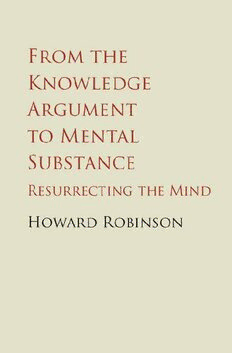Table Of ContentFromtheKnowledgeArgumenttoMentalSubstance
This book presents a strong case for substance dualism and offers
a comprehensive defence of the knowledge argument, showing that
materialismcannotaccommodateorexplainthe‘hardproblem’ofcon-
sciousness. Bringing together the discussion of reductionism and
semantic vagueness in an original and illuminating way, Howard
Robinsonarguesthatnon-fundamentallevelsofontologyarebesttrea-
tedbyaconceptualistaccount,ratherthanarealistone.Inadditionto
discussingthestandardversionsofphysicalism,heexaminesphysicalist
theoriessuchasthoseofMcDowellandPrice,andaccountsofneutral
monismandpanpsychismfromStrawson,McGinnandStoljar.Healso
explores previously unnoticed historical parallels between Frege and
AristotleandbetweenHumeandPlotinus.Hisbookwillbeavaluable
resourceforscholarsandadvancedstudentsofphilosophyofmind,in
particularthoselookingatconsciousness,dualismandthemind–body
problem.
Howard Robinson is University Professor in the Department of
Philosophy at Central European University, Budapest; Senior Fellow
at Rutgers Center for Philosophy of Religion, New Brunswick; and a
VisitingScholaratFordhamUniversity,NewYork.Heistheauthorof
Matter and Sense: A Critique of Contemporary Materialism (Cambridge,
1982)andPerception(1994).
From the Knowledge Argument
to Mental Substance
Resurrecting the Mind
Howard Robinson
UniversityPrintingHouse,CambridgeCB28BS,UnitedKingdom
CambridgeUniversityPressispartoftheUniversityofCambridge.
ItfurtherstheUniversity’smissionbydisseminatingknowledgeinthepursuitof
education,learningandresearchatthehighestinternationallevelsofexcellence.
www.cambridge.org
Informationonthistitle:www.cambridge.org/9781107087262
©HowardRobinson2016
Thispublicationisincopyright.Subjecttostatutoryexception
andtotheprovisionsofrelevantcollectivelicensingagreements,
noreproductionofanypartmaytakeplacewithoutthewritten
permissionofCambridgeUniversityPress.
Firstpublished2016
AcataloguerecordforthispublicationisavailablefromtheBritishLibrary
LibraryofCongressCataloguinginPublicationdata
Robinson,Howard.
Fromtheknowledgeargumenttomentalsubstance:resurrectingthe
mind/HowardRobinson.
NewYork:CambridgeUniversityPress,2016.|Includes
bibliographicalreferencesandindex.
LCCN2015036048|ISBN9781107087262
LCSH:Philosophyofmind.|Knowledge,Theoryof.|Materialism.
LCCBD418.3.R7542016|DDC128/.2–dc23
LCrecordavailableathttp://lccn.loc.gov/2015036048
ISBN978-1-107-08726-2Hardback
CambridgeUniversityPresshasnoresponsibilityforthepersistenceoraccuracyof
URLsforexternalorthird-partyinternetwebsitesreferredtointhispublication,
anddoesnotguaranteethatanycontentonsuchwebsitesis,orwillremain,
accurateorappropriate.
For
Jocelyn
Contents
Preface pagexi
Acknowledgements xiii
PartIThepoweroftheknowledgeargument 1
1 Introducingtheknowledgeargument 3
1.1 Settingthecontext 3
1.2 Smart,Armstrongandtopicneutrality 4
1.3 Problemswiththetopicneutralanalysis 8
1.4 Theknowledgeargument,informallystated 12
1.5 KAanditscloserelatives 14
1.6 KAformallystated 16
1.7 Possibleobjections 19
2 Dennett’sdenialofMary’signorance 22
2.1 Maryandthebluebanana:anargumentorachallenge? 22
2.2 SwampMaryandRoboMary:howMarycouldhavepulleditoff 26
2.3 Acoupdegrace:isMBBevenrelevant? 28
2.4 Dennett’sbehaviourismandthedubiousrelevanceofMary’s
scientificknowledge 29
2.5 Thetensionbetweenstructuralandfunctionalcriteriafortheidentity
ofmentalstates 34
2.6 Conclusion:theshapeofDennett’sfailure 35
3 Theabilitieshypothesisandotherfunctionaliststrategies 36
3.1 Introductoryremarks 36
3.2 Theabilitieshypothesis:whatisitatheoryabout? 36
3.3 StalnakerandLewisontheknowledgeargumentand‘phenomenal
information’ 44
3.4 WhatwouldatrulyphysicalistAHneedtosay? 46
3.5 Ageneralargumentagainstanalyticbehaviourismandfunctionalism 48
3.6 Kirk,zombies,epiphenomenalismandphysicalism 52
4 WhyFrankshouldnothavejiltedMary:theinadequacyof
representationalismasastrategyagainstKA 57
4.1 HowJacksonhaschangedhisopinion 57
4.2 Purerepresentationalismandexperience 60
vii
viii Contents
4.3 Whatisrepresentationalism? 61
4.4 Theplausibilityof(2) 65
4.5 Physicalismand(3)and(4) 66
4.6 Thephysicalistneedfor(5) 67
4.7 Standardphysicalistaccountsofrepresentation 70
4.8 Jackson’suseofrepresentationalism 70
4.9 Conclusionoftheargument 71
5 Thephenomenalconceptstrategy:moreenigma
thanargument 73
5.1 Tryingtounderstandthephenomenalconceptstrategy 73
5.2 Phenomenalconcepts,dualismandphysicalism 75
5.3 WhyIhavedifficultyunderstandingthePCS 77
5.4 TheproblemfacingPCS 78
5.5 Takingoption(a):phenomenalconceptsarewhatpresentbrain
statesasexperiences 79
5.6 Phenomenalqualities,transparencyandourconceptionofthe
physicalworld 83
5.7 Options(b)and(c):identityisgivenbutPCSexplainsawaythe
mystery 85
5.8 Option(d):thetopicneutralapproach 89
5.9 AmoregeneralobjectiontoPCSasawhole 89
5.10 PapineauandtheLeibnizLawproblem 91
5.11 Conclusion 92
6 Davidson,non-reductivephysicalismandnaturalism
withoutphysicalism 93
6.1 DonaldDavidsonandnon-reduction 93
6.2 Thetwosensesof‘non-reductive’ 93
6.3 Confusingthetwosenses 94
6.4 Davidson’stheory,naïvelyandsophisticatedlyunderstood 97
6.5 Anomolousnessandnormativity 101
6.6 Naturalismwithoutphysicalism...?(i)McDowell 104
6.7 Naturalismwithoutphysicalism...?(ii)PriceandRorty 107
6.8 Therootoftheproblem 109
6.9 Conclusion 111
7 Mysterianism,neutralmonismandpanpsychism 112
7.1 Themysterianoption 112
7.2 Theappealtoignorance 115
7.3 Ageneralobjectiontothe‘hiddenproperty’approach 117
7.4 Russellandneutralmonism 118
7.5 Howqualitiesmightbethoughtofascomplementingthescientific
conceptionofmatter 119
7.6 Explicitpanpsychism 126
7.7 Conclusion 130
Contents ix
8 Conclusion:therealpoweroftheKA–qualia,qualities
andourconceptionofthephysicalworld 133
8.1 Theinitialpredicament 133
8.2 ExtendingthescopeoftheKA 134
8.3 HowallobjectionstotheKAmissthepoint 138
8.4 Adirectrealistresponse 141
8.5 Empiricismandphysicalism 141
PartIIWhyphysicalismentailsepiphenomenalism 145
9 Reductionismandthestatusofthespecialsciences 147
9.1 Whatisreduction?Thenatureoftheproblem 147
9.2 Differenttheoriesofreduction 148
9.3 Non-reductiveconceptions 154
9.4 Thelimitationsoftype(3)reductionandtheopeningtodualism 156
10 Vagueness,realism,languageandthought 160
10.1 Introduction 160
10.2 Theproblemofvagueness 160
10.3 Possiblesolutions 162
10.4 Thealternativepictureoflanguage 165
10.5 Vagueness 170
10.6 Sorites 173
10.7 Theresultantnatureoflanguage 175
11 Compositeobjects,thespecialsciences,conceptualism
andrealism 177
11.1 Introduction 177
11.2 Conceptualistandrealistexistenceclaims 178
11.3 Howtodecidetheissue 180
11.4 Causalefficacyandexistence:(a)defending‘commonsense’ 181
11.5 Causalefficacyandexistence:(b)therealityandpowerof
structures 183
11.6 Causalefficacyandexistence:(c)explanatoryforceandrealism 186
11.7 Humanperspectives,Newtonianscienceandconceptualism 190
11.8 GeneraladvantagesofCI 190
11.9 Conceptualismandthemind 191
11.10 Conclusion 193
12 Whythereare(probably)nophysicalindividuals 194
12.1 Vaguenessandindividuality 194
12.2 Theineliminabilityofvaguenessincounterfactualidentity:
theprimafaciecase 195
12.3 Isvaguenessinidentitypossible? 196
12.4 Denialsofvagueness:Wiggins’streatmentofvaguenessinidentities 197
12.5 Denialsofvagueness:Salmonandhaecceitas 198
12.6 Denialsofvagueness:fixedleewayandnoleeway 201

